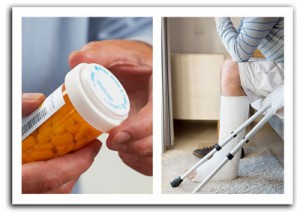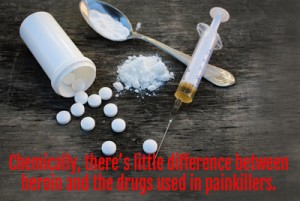 When you’re in pain after surgery or a injury, there’s little alternative but to take the painkillers the doctor prescribes for you. Fortunately for most people, recovery is fairly quick and painkillers may only be needed for a few days or perhaps a week and a half for something a little more severe. Of course, there are cases where people need painkillers for an extended time, just to have a tolerable quality of life.
When you’re in pain after surgery or a injury, there’s little alternative but to take the painkillers the doctor prescribes for you. Fortunately for most people, recovery is fairly quick and painkillers may only be needed for a few days or perhaps a week and a half for something a little more severe. Of course, there are cases where people need painkillers for an extended time, just to have a tolerable quality of life.
In the past, doctors have not been particularly careful to distinguish between an injury requiring a short course of painkillers and one that required pain relief for weeks. Doctors have been sending patients home with a bottle of pills sufficient for 30 days of relief. When the pain eased, the pill bottles went on the shelf of the medicine chest.
Or did it?
Excessive Prescriptions Can Lead to Addiction
Jamie Lee Curtis tells the story about how she became addicted to painkillers after taking opiates after cosmetic surgery. She continued to use the drugs after the pain of her surgery was over because they acted as a “warm bath from which to escape painful reality.” She even resorted to stealing some of her sister’s painkillers that were prescribed after an injury. Ms. Curtis recovered from her addiction to pills and alcohol both.
When you have too many pills on hand, the temptation can be great to keep taking them to enjoy that mellow oblivion one gets from either painkillers or other opiates such as heroin. Chemically, there’s little difference between heroin and the drugs used in painkillers.
 When a person does wind up addicted to their pain pills, it is all too easy to decide to switch to heroin, which is much cheaper and does not require a doctor visit. And then you have the kind of heroin epidemic that is seen these days, especially in New England and states like Minnesota. At one major drug rehab facility in Cleveland, half the people being treated for heroin addiction had started their opiate abuse with prescription painkillers.
When a person does wind up addicted to their pain pills, it is all too easy to decide to switch to heroin, which is much cheaper and does not require a doctor visit. And then you have the kind of heroin epidemic that is seen these days, especially in New England and states like Minnesota. At one major drug rehab facility in Cleveland, half the people being treated for heroin addiction had started their opiate abuse with prescription painkillers.
Addiction to opiates of any kind is so terribly dangerous because of the ever-present danger of overdose. Opiates and opioids – natural derivatives of the opium poppy or similar synthetics – suppress the body’s ability to breathe. An overdose can cause one to stop breathing. If there’s any miscalculation of the dose at all, death results far too often. Since 2000, more than 44,000 people have died as a result of an overdose of heroin or painkillers.
Cravings and Withdrawal Drive Continued Use of the Drugs
Anyone who has ever been addicted to opiates knows what happens when you stop taking them. It’s like a case of the flu turned up far beyond maximum. Vomiting, diarrhea, intense muscle pains and aches, cramping, depression and more. Once a person goes through this ordeal, they will do just about anything to avoid it in the future. But that means staying on these drugs, risking their life with every dose. Possibly committing crimes to be able to get their drug supplies.
If you or someone you know is addicted to pain medication or other opiates, get help now before the addiction becomes worse. The Narconon program has been helping people recover from opiate addiction for nearly fifty years – in fact, it was founded by a heroin addict who learned how to overcome his own addiction.
The Narconon program has a unique method of making that withdrawal much more tolerable by providing around the clock nutritional support and through the use of gentle physical recovery and relaxation processes and reorientation exercises. Many people have said that this withdrawal was the most tolerable one they ever experienced. We also provide a full detoxification where drug residues that have lodged in the fat tissues are able to be flushed out, leaving a person with a fresh outlook on life.
If you or someone you care about needs this kind of help, call us today at 1-800-775-8750.
http://www.people.com/people/article/0,,20293036,00.html
https://ncadd.org/in-the-news/1014-use-of-heroin-and-prescription-painkillers-have-become-integrated
http://www.cdc.gov/nchs/data/databriefs/db190.htm